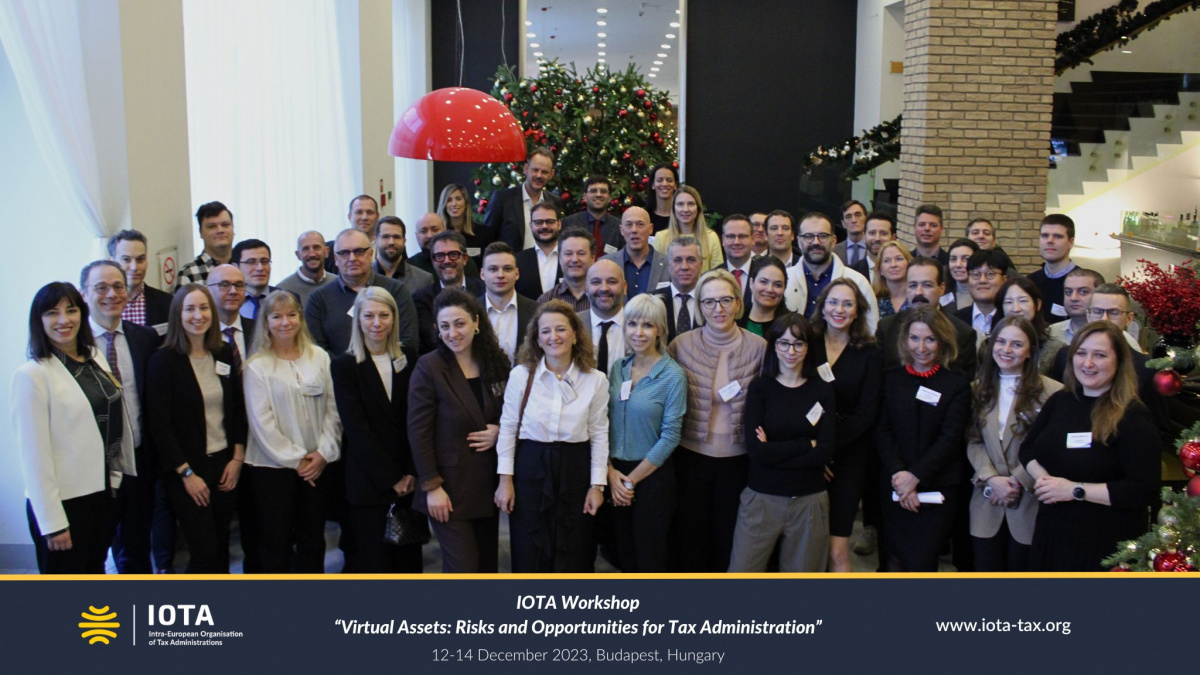As we approach the end of 2023, IOTA successfully organised its final technical activity under the IOTA 2023 Work Programme. The IOTA Workshop "Virtual Assets: Risks and Opportunities for Tax Administration" was the third fully face-to-face technical event of the year and took place from 12-14, December in Budapest, Hungary. As always, it was a pleasure to have representatives from our international partner organisations including the European Commission, the OECD Centre for Tax Policy and Administration & the OECD – JITSIC along with 50 tax officials from 21 IOTA member countries at the event.
The unique characteristics of virtual assets are creating new challenges for tax administrations across the entire tax chain. This Workshop, "Virtual Assets: Risks and Opportunities for Tax Administration," aimed to explore the impact of the surge in the use of digital assets in both domestic and cross-border transactions and the challenges involved in managing them. The presentations of the Workshop covered topics such as how to declare these virtual assets, trace them if they are not declared, prevent their misuse, seize and realise them to settle debts, and more.
During the first day’s sessions, IOTA member countries such as France, Italy, Poland, Slovenia, and Spain set the stage for presentations and gave an overview of the impact of using Virtual Assets in the entire tax chain. The following IOTA tax administrations covered this matter:
- Poland: “Virtual assets - observations from tax policymaking perspective” presented by Joanna Węgrzyn & Kamil Łukasik;
- France: “Third-party request to crypto assets exchange for tax investigations” by Frédéric Garnaud & Hamel Lefebvre;
- Spain: “Spanish Exchanges as collaborators and as taxpayers” presented by Victoria Pérez de la Cruz;
- Slovenia: “Revolutionizing Cross-Border Transactions: Exploring Crypto Payment Service Providers Leveraging RippleNet“, presented by Petra Janež;
- Italy: “The new legislation, guidance and voluntary disclosure for crypto assets in Italy in 2023” co-presented by Edoardo Mizzon & Claudio Schettino.
In the latter half of the day, international partner organisations, the European Commission, the OECD Centre for Tax Policy and Administration & the OECD – JITSIC, provided attendees with an update on the activities regarding the impact of the use of digital assets:
- European Commission: “EU Tax Transparency Rules: DAC8 - Recent Developments in EU Tax Policy” presented by Luis Calvo-Parra;
- OECD Centre for Tax Policy and Administration: “The crypto-asset reporting framework” presented by Paul Hondius;
- OECD – JITSIC: “JITSIC Presentation” presented by Simon Hellmers;
- OECD – JITSIC: “OECD JITSIC Crypto-asset Expert Group” presented by Erick D Bell.
The second day of the Workshop focused on more practical knowledge putting IOTA member administrations’ case studies into the spotlight. Speakers of the day shared their valuable perspectives on various cases involving investigating, auditing, seizing digital assets, as well as using them as payment. This session featured numerous presentations from IOTA member countries such as Austria, Bulgaria, Finland, Poland, and Sweden, along with our associate member administration, the Republic of Korea.
- Austria: “Investigating, analysing and seizing crypto assets” by Verena Hoppl & Alexander Stelzer;
- Sweden: “Crypto as payment - a business case” by Marcus Pettersson;
- Bulgaria: “Audit of a non-compliant crypto mining company owned by foreign citizens” by Kaloyan Lazov;
- Finland: “Seizing virtual assets case presentation” by Antero Laakso;
- Poland: “Seizure of cryptocurrencies” by Iwona Banach;
- Republic of Korea: “Seizing and Recovery of Virtual Assets in the Republic of Korea” by Su-jin JUN.
Additionally, IOTA member tax administrations also presented their views on the main challenges they faced regarding the existing international exchange of information framework on Virtual Assets. This session explored more in this topic by speakers from Finland & Sweden:
- Finland: “Steps to obtain information abroad” presented by Juho Hasa;
- Sweden: “Exchange of crypto information - benefits and challenges” by Inger Berntsson.
On the closing day of the Workshop, participants spent the morning with a presentation delivered by Belgium broadening their horizons on how IOTA member tax administrations are planning to implement CARF/DAC 8 from an operational point of view.
- Belgium: “The operational implementation of the automatic exchange of information of CARF/DAC 8 in Belgium” presented by Siham Izmar.
This session was followed by an open debate led by Inger Berntsson (Sweden), Juho Hasa (Finland), Paul Hondius (OECD) and Luis Calvo-Parra (EC) on the next steps for mitigation of risks and exploring the opportunities arising from the use of Virtual Assets. At the last session of the Workshop participants discussed the main benefits of the event, considered the expectations they had set out at the start of the Workshop and whether they had been met, as well as offered ideas as to how the subject could be taken forward in future.
All the materials and presentations are now available online on the event’s webpage. This Workshop was led by the IOTA International Taxation Expert Ivana Donchevska and supported by her fellow colleague Massimo Morarelli. Earlier this year, IOTA organised a series of events on the topics of Cryptocurrencies and Virtual Assets, as a platform for knowledge sharing, exchanging practical experiences, and facilitating cooperation between IOTA members. Find out more about these activities at the following links below:
- 20 April 2023: IOTA Webinar “Understanding Practices to Facilitate Risk Analysis of Transactions Involving Crypto Assets”
- 13 September 2023: IOTA Webinar “International Approaches to Virtual Currency”

